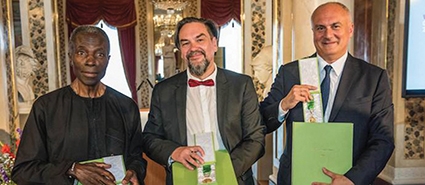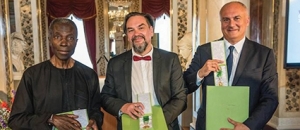Lordkipanidze Awarded Prestigious Goethe Medal
What can culture contribute to international understanding? How can we promote intercultural dialogue? Yurii Andrukhovych, Akinbode Akinbiyi and David Lordkipanidze offered impressive answers to these questions when, on 28 August, the three cultural professionals were honored with the 62nd Goethe Medal in Weimar.
The Goethe Medal was established by the executive committee of the Goethe-Institut in 1954 and was acknowledged as an official decoration by the Federal Republic of Germany in 1975. The Goethe Medal is traditionally awarded on Johann Wolfgang von Goethe’s birthday, 28 August for those making a special contribution as ambassadors of the German language or in international cultural exchange.
Since it was first awarded in 1955, a total of 341 figures from 63 countries have been honored. The awardees have included Adonis, Daniel Barenboim, Pierre Bourdieu, David Cornwell AKA John le Carré, Sir Ernst Gombrich, Lars Gustafsson, Ágnes Heller, Petros Markaris, Sir Karl Raimund Popper, Jorge Semprún, Robert Wilson, Neil MacGregor and Helen Wolff.
“Migration of Cultures – Cultures of Migration” was the motto of the conferment of the 2016 Goethe Medal. Klaus-Dieter Lehmann, the president of the Goethe-Institut, awarded the official decoration of the Federal Republic of Germany to photographer Akinbode Akinbiyi, writer Yurii Andrukhovych and General Director of the Georgian National Museum, David Lordkipanidze.
“Each year, the conferment of the Goethe Medal in Schloss Weimar on Goethe’s birthday is a highlight for the appreciation of cultural dialogue, for the equal and independent meeting of cultures and their active mediation,” Lehmann said. “Our human life is primarily cultural. It is therefore worthwhile tackling social conflicts on the path of cultural convergence. It is not without reason that the key theme of this year’s Goethe Medal awards is the migration of cultures and the culture of migration. Awarded are three assiduous intercultural ambassadors, three outstanding individuals who deal with this contemporary issue in their work in the fields of photography, science and literature.”
One of the most prestigious paleoanthropologists and archaeologists worldwide, the General Director of the Georgian National Museum, David Lordkipanidze, works to advance cultural and educational policies in Georgia and has made a decisive contribution to German-Georgian cultural relations. He lastingly spurred on the modernization of Georgian museums and for over 20 years he has headed the excavations at Dmanisi in Georgia. The 1.8 million-year-old skeleton remains found there have made him a world-renowned paleoanthropologist and archeologist.
“[David] believes that science doesn’t only belong to scientists. It belongs in public spaces, museums, exhibitions and archeological excavations. As General Director of the Georgian National Museum, he determinedly and successfully campaigned for scientific findings to be made generally accessible,” Friederike Fless, President of the German Archaeological Institute, said.
For years Lordkipanidze has worked alongside the Goethe Institut and with famous German partners from culture and education. These include the Stiftung Preussischer Kulturbesitz and the Senckenberg Museum in Frankfurt.
“The activities of the Goethe Institut in Georgia are not restricted to spreading the German language. With justified appreciation and the promotion of culture and education, it supports humanism and basic research,” said Lordkipanidze.
In his acceptance speech, Lordkipanidze discussed the constant evolution of culture, stating: “Today, looking on the development of the processes in the modern world, Goethe’s words are still relevant: In nature, we never see anything isolated, but everything in connection with something else which comes before it, beside it, under it and over it. My country, Georgia, is also part of these processes, using science and culture in the first place to be connected to the rest of the world – to be a part of the whole world.”
Each of the winners have, in their own way, contributed to international cultural exchange and cultural understanding.











